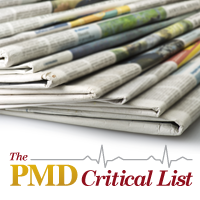- Revenue Cycle Management
- COVID-19
- Reimbursement
- Diabetes Awareness Month
- Risk Management
- Patient Retention
- Staffing
- Medical Economics® 100th Anniversary
- Coding and documentation
- Business of Endocrinology
- Telehealth
- Physicians Financial News
- Cybersecurity
- Cardiovascular Clinical Consult
- Locum Tenens, brought to you by LocumLife®
- Weight Management
- Business of Women's Health
- Practice Efficiency
- Finance and Wealth
- EHRs
- Remote Patient Monitoring
- Sponsored Webinars
- Medical Technology
- Billing and collections
- Acute Pain Management
- Exclusive Content
- Value-based Care
- Business of Pediatrics
- Concierge Medicine 2.0 by Castle Connolly Private Health Partners
- Practice Growth
- Concierge Medicine
- Business of Cardiology
- Implementing the Topcon Ocular Telehealth Platform
- Malpractice
- Influenza
- Sexual Health
- Chronic Conditions
- Technology
- Legal and Policy
- Money
- Opinion
- Vaccines
- Practice Management
- Patient Relations
- Careers
The PMD Critical List: Doctors Need Specific Empathy Skills
Empathy is different from compassion – and physicians need to be good at it. That story tops this week’s PMD Critical List.

Empathy is different from compassion — and physicians need to be good at it. That story tops this week’s PMD Critical List. Also making the list: A doctor launches an app specifically designed to help people in the healthcare industry, depression starts long before a physician starts practicing, and Americans died younger in 2015 than they did in 2014.
• The Empathic Doctor (Live Science)
Instead of being urged to simply "be more compassionate," doctors should learn specific empathy skills during their training to improve their care of patients, argues David Jeffrey, PhD student, an honorary lecturer in palliative medicine at the Center for Population Health Sciences in the UK. “Empathy, unlike compassion or sympathy, requires an effort,” he says.
• Instead of Denying Emotions, Physicians Can Learn from Them (Health Media Leaders)
A useful profile of Danielle Ofri, MD, about her book, What Doctors Feel: How Emotions Affect the Practice of Medicine. “Good listening skills come from being emotionally solid. Emotionally stunted people they are not very good listeners. They don't intuitively know how to connect with patients and that is reflected in patient satisfaction."
• The Struggle and Triumph of America's First Black Doctors (The Atlantic)
A compelling and caring account about how pioneering “African American physicians have dealt with distrust and misperceptions for more than a century.” In 2008, the AMA issued an official apology, acknowledging its “past history of racial inequality toward African-American physicians.”
• Physician-Entrepreneur Seeks to Cure Credentialing Ills (The Rivard Report)
Called a “medical Millennial,” Jon Larson, MD, has launched, MedSpoke, a software application aimed at soothing some of the headaches of credentialing in the healthcare industry.” It’s “the first physician-centered mobile app that gives the physician the ability to manage all their credentialing data in one place.”
• Cost is Most Urgent US Health Problem (Gallup Poll)
“More Americans now mention costs (27%) than mention access (20%) when asked to name the most urgent healthcare problem facing the nation,” according to a new Gallup Poll. The survey also noted large declines in worries about bioterrorism, AIDS, and obesity.
• The Doctor’s Hot Prescription Pad (CBS News)
“Despite evidence that certain drugs aren’t always necessary, doctors are still prescribing these treatments, according to a survey by Annals of Internal Medicine. “Antibiotics are by far the drugs most frequently used in situations where they’ll provide no value for patients.”
• Doctor Depression Begins in Medical School (Vox)
“The way we train doctors may endanger their mental health. In a new systematic review and meta-analysis in JAMA that draws from 195 studies on depression among medical students, researchers found that 27% experienced depression or depressive symptoms, about three times higher than the general population.”
• University Mandates Mediation for Medical Students (Fulcrum)
A mindful report from north of the boarder: “The University of Ottawa’s Faculty of Medicine has implemented new meditation sessions as a way for students to relieve stress. Meditation reminds medical students to stop and smell the roses from time-to-time. It allows us to keep centered and re-evaluate situations.”
• A Physician’s Guide to Sleep in a Stressful Age (The Atlantic)
Who needs a good rest more than burned-out doctors? Here, a physician sleep expert offers some advice. “Since my residency, I’ve become sort of obsessive about sleep—how much we really need, how to optimize it, whether there are ways to game the system. What I’ve found is a perpetual divide between what’s known to scientists and what most people do.”
• State of Well-Being Rankings for Older Americans (Washington Post)
“Despite the creaky knees and reading glasses that come with old age, Americans tend to get happier as they grow older,” according to a new survey by Gallup-Healthways. The report found people ages 55 and older do better than younger people across five parameters—financial, community, purpose, social, and health and well-being. And older Americans are happiest in Hawaii, least happy in West Virginia.
• Life’s Too Short and It Just Got Shorter, CDC Says (MD Magazine)
It's not the best news for the holidays. According to a report from the US Centers for Disease Control and Prevention (CDC), people in the US are likely to die a bit younger than they were a year earlier. That was slightly more true for men than women.
